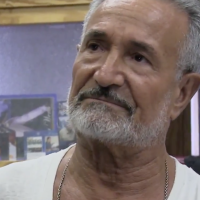The rise in people who claim to have gluten allergies has been met with ridicule but many legitimate health conditons were once dismissed as imaginary

A lot of the time, I looked fine. I seemed like I was fine, but there was this mystery at the heart of everything, says Shauna Ahern, on life before she was diagnosed with celiac disease in 2005. I caught every flu that came into town. I had surgery for fibroid tumours and never fully recovered. I was in a terrible car accident, and I never really recovered. It was like I was not quite myself for most of my life.
Shauna is one of approximately 1.76 million Americans diagnosed with celiac disease a debilitating condition where the body processes gluten as a toxin. There is no cure, but eliminating gluten completely from ones diet can eradicate the symptoms. However, according to a study published this week, there are another 2.7 million people in the US choosing to follow a gluten-free diet.
And this is where things get heated.
The study authors say that this rise in gluten-free living could be due to a variety of factors a desire to lose weight, public perception that gluten-free is somehow healthier, or self-diagnosis of gluten sensitivity.
Meg Mullens, a research and development programme manager from New York, falls into the last camp. My mother and nephew are celiac, so Ive been tested and I know I dont have it, but I know I feel so much better now Im gluten-free. If I have it accidentally, I have a terrible stomach ache the next day. Antacids and Pepto Bismol do nothing for it. And for the self-diagnosed like Mullens, the reactions of others who are quick to mock her can be particularly difficult.
Here in LA, [gluten] is comparable to satanism, joked Jimmy Kimmel recently, before poking fun at gluten-free people who didnt appear to know what gluten actually is. Then there are the #hotgirlseatingpizza of Instagram, who like their gluten with just a hint of passive aggression. Gluten-free is for mentally ill people with diseases like OCD that feel that eating is killing them, reads a comment on a piece called meet the gluten-free girls. Reddit and other forums abound with threads called things like Your gluten allergy is fake and I hate you.
Of course, there will be some people claiming to have a bogus allergy for attention, or to cover up the fact that they just really want to lose weight.
But those who suspect they are genuinely gluten sensitive feel angry that they arent taken seriously. I hear from so many people who say their friends or family have a problem with it, says Ahern who writes a hugely popular blog about gluten-free living. They get reactions like why do I have to cook a special meal for you, its all in your head, youll get bored of this soon, just have a doughnut!
In fact, gluten sensitivity can be very difficult to diagnose.
There are plenty of grey areas where we havent figured everything out yet, says Dr Sheila E Crowe, president-elect of the American Gastroenterological Association. We have defined tests for celiac disease, but with gluten sensitivity its somewhat ethereal. There is no one good blood test that will define it, because its an area of continued investigation. We have to understand whether patients are actually reacting to gluten, or it could be a wheat starch intolerance, or even something way beyond the wheat.
The current battle over gluten has some peculiarly modern elements the Instagram wars, the celebrity advocates. But in other ways, its the story of countless other medical conditions that dont quite fit a linear model of symptoms, diagnosis, treatment.
Its the story of how we react to illnesses we cant quite explain, or write off as being all in the mind.
Back in the 1880s, a physician called George Miller Beard described a condition he called American nervousness. Sufferers experienced migraines, poor digestion, fatigue and depression. Beard thought it was caused by the stress of living in the city and the cure was, essentially, move out of town and be less stressed.
American nervousness was also known as neurasthenia, a term rarely used today but in all likelihood it encompassed conditions such as fibromyalgia, PTSD and chronic fatigue syndrome (CFS) all of which are no strangers to controversy.
For a long time, CFS was described as the yuppie flu, an illness for those privileged enough to have time to feel tired and assumed by many to be an imaginary affectation. (Status is often important in the perception of unexplained illnesses. The comedian Joy Behar recently described celiac disease as a bunch of baloney [] If you have a disease that a celebrity can pitch, then they will find a cure for the disease.) It took decades of misunderstanding before the possibility was even acknowledged that these conditions might be real.
First you have the trauma of the illness, then you have the trauma of how other people experience it, says Leonard Jason, professor of psychology at DePaul Universitys Centre for Community Research in Chicago. Jason has been researching the experiences of people with unexplained illness for over 25 years.
Theres a bias that occurs. Whenever you have illnesses where the majority of those affected are women, for example, you have people speculating whether theyre just bored housewives who are complaining, that really they have a psychiatric condition.
Family, friends and work colleagues often have a hard time understanding ironically, because theyve probably experienced symptoms themselves. Everyone has flu-like symptoms or fatigue at some point, says Jason. But if you basically look OK, its hard for other people to relate to the fact that you might be ill with something that is in their experience temporary. They cant understand having the worst case of flu youve ever had for months and months.
Healthcare professionals often struggle to deal with unexplained illness in a holistic way. Ive talked to people with chronic fatigue syndrome who say I go to the clinic and they send me straight to the psychologist or the psychiatrist, because theyve got this label for me, and the other medical problems I have dont get treated, says Jason.
When the struggle to even be acknowledged, let alone treated, is this hard, is it any wonder that some people prefer to self-diagnose and self-medicate, that they prefer to turn to online communities for advice and support, rather than hear its all in your head?
Unfortunately, this leads to other problems. If, for example, youve been living gluten-free for some time, it will be much harder to determine whether you really do have celiac disease or some other condition further down the line, says Crowe. And in fact, you might have something like Crohns disease, which would be treated completely differently from celiac disease.
Seeking out alternative treatments can also be fraught with complications and expense. I saw a lady recently who had been told by an alternative practitioner that she needed $2,000 to $3,000 worth of intravenous medication that was completely unnecessary, Crowe says.
In 20 years time, we may have a far better understanding of what gluten sensitivity is. We may know far more about the underlying causes of conditions such as CFS, or multiple sensitivity syndrome or Morgellons or Gulf war syndrome.
Eleven years ago, Shauna Aherns first doctor refused to test her for celiac disease when she told him shed researched it. Hopefully, that wouldnt happen today. So perhaps the next time your friend orders gluten-free pasta, you could try not rolling your eyes.
Read more: https://www.theguardian.com/lifeandstyle/2016/sep/08/gluten-free-diet-celiac-disease-self-diagnosis






